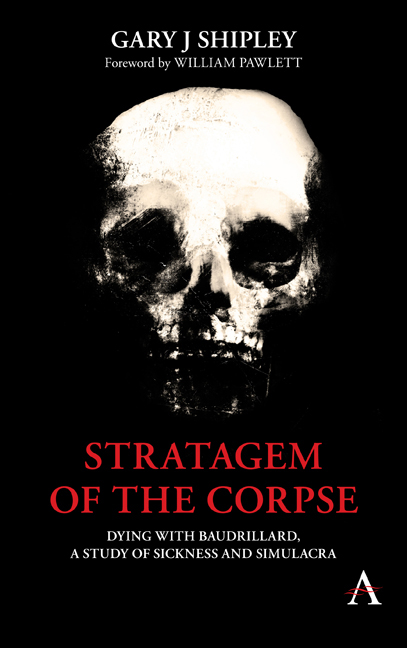Book contents
- Frontmatter
- Dedication
- Contents
- Acknowledgements
- Foreword by Pawletts William
- Introduction
- Chapter 1 On Decay and Other Synthetics
- Chapter 2 Stratagem of the Corpse
- Chapter 3 A Bleak Non-History of History
- Chapter 4 The Hyperactivity of Objects
- Chapter 5 The Unnamable Catastrophe
- Chapter 6 A Cure for Vertigo
- Chapter 7 Chance and the Temporality of Death
- Chapter 8 The Possibility of Nihilism
- Chapter 9 Smell-O-Vision: The Murder Show
- Chapter 10 The Evil Death
- Chapter 11 False Confessions and the Madness of Death: Making Death Speak
- Chapter 12 Black Light: Nigredo and Catastrophe
- Appendix 1 Whiteout: Spatiotemporal Interstices, Necropresence and the Immortality of Now
- Appendix 2 Pure Dreaming: Radicalized and Vermiculated Thought, or Death as an Earworm
- Appendix 3 The Non-Existence of the Scream
- Index
Chapter 1 - On Decay and Other Synthetics
Published online by Cambridge University Press: 20 February 2020
- Frontmatter
- Dedication
- Contents
- Acknowledgements
- Foreword by Pawletts William
- Introduction
- Chapter 1 On Decay and Other Synthetics
- Chapter 2 Stratagem of the Corpse
- Chapter 3 A Bleak Non-History of History
- Chapter 4 The Hyperactivity of Objects
- Chapter 5 The Unnamable Catastrophe
- Chapter 6 A Cure for Vertigo
- Chapter 7 Chance and the Temporality of Death
- Chapter 8 The Possibility of Nihilism
- Chapter 9 Smell-O-Vision: The Murder Show
- Chapter 10 The Evil Death
- Chapter 11 False Confessions and the Madness of Death: Making Death Speak
- Chapter 12 Black Light: Nigredo and Catastrophe
- Appendix 1 Whiteout: Spatiotemporal Interstices, Necropresence and the Immortality of Now
- Appendix 2 Pure Dreaming: Radicalized and Vermiculated Thought, or Death as an Earworm
- Appendix 3 The Non-Existence of the Scream
- Index
Summary
To realize that simulation is variegated is to outline a diagrammatic order of decay that is no less real for exercising its effects on bodies and materials that are not. It is pointless at this stage to talk of truth, only of decay. For veridicality is not to be found in the blown and liquid remains of some once living creature, or the shards and shreds of buildings or machinery, but in the transformative process through which an illusion can be seen to grasp at mortification: ‘Imagine the true that has absorbed all the energy of the false: there you have simulation.’ And if decay is thought to correlate with or addend either malfunction or death, it is only because we’ve failed to realize how decay was there first, always there, at the beginning of things. If there's anything still claiming itself as a model of the real, it's the hyena in bed with its throat cut.
When I woke in the desert, I saw only haze. And the sand was integrated there only allegorically, by implication of where someone else might observe me, or where my hands might orientate their relative stillness. There was nothing to ground a sense of the abstract existing on the periphery of everything else: ‘the charm of abstraction’ coincided with the lifelessness of sand, unable to separate itself, no longer charm, no longer abstraction. I felt my feet sink into the mad lie of this-place-as-opposed-to-that, its resistance to thought dispersing, accommodating the superstition of territories outside of itself. If any hope of sense remained it was that of disappearance, disappearance in an instant, or rather in no time at all – rot like a soundless, heatless explosion undoing ‘this imaginary of representation’, this simultaneous occupation of the nucleated, of the thinged zero.
When we hear about some new case of someone's face rotting off, can we do anything but groan? As if it is needed where we’re going. It is no longer credible to attribute synthesis to facial expressions. For you to see me, I’d have to plunge my face into a liquidizer. At that moment we could both forget to breathe, as if the air no longer needed us.
- Type
- Chapter
- Information
- Stratagem of the CorpseDying with Baudrillard, a Study of Sickness and Simulacra, pp. 7 - 20Publisher: Anthem PressPrint publication year: 2020



